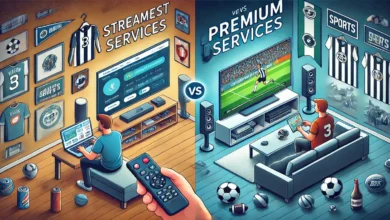Fapelli vs. Traditional Platforms: A Comparison of Features and Benefits

In the ever-evolving world of digital platforms, businesses and individuals constantly seek the best tools to streamline operations, improve productivity, and boost overall efficiency. The emergence of new technologies and platforms has paved the way for innovative solutions that challenge the traditional ways of doing things. One such modern platform that has been gaining attention is. But how does it compare to traditional platforms? This article will compare and conventional platforms, focusing on their features, benefits, and potential drawbacks.
What Is Fapelli?
Before diving into the comparison, it’s essential to understand what is and why it has become a popular choice for many businesses and tech enthusiasts. it’s a next-generation digital platform that offers an integrated and scalable solution for companies across various industries. With its user-friendly interface, cloud-based infrastructure, and automation capabilities, it’s aims to redefine how businesses operate online. it’s offers a comprehensive suite of tools that can replace several traditional platforms, from project management and team collaboration to data storage and analytics.
Traditional Platforms: An Overview

Fapelli Traditional platforms refer to established digital tools used for many years. These include platforms like Microsoft Office 365, Salesforce, Google Workspace, and Slack. These platforms are typically known for their specialized functionalities, such as document creation, team collaboration, email communication, and customer relationship management (CRM).
Although traditional platforms have been tried and tested, they often have limitations that newer platforms like it’s aim to address. For example, traditional tools may not be fully integrated, so users usually must switch between different applications for different tasks. They may also lack advanced automation and AI features that could enhance productivity and streamline workflows.
Key Features of Fapelli vs. Traditional Platforms
When comparing it’s to traditional platforms, the differences in features become apparent. Here’s a breakdown of the key aspects:
- User Interface and Experience
The platform offers a modern, sleek, intuitive user interface (UI) to minimize the learning curve. The dashboard is fully customizable, allowing businesses to tailor the system to their needs. The platform is built with the end-user in mind, making navigating and accessing features simple.
- Traditional Platforms: While many conventional platforms have also worked on improving their UI over the years, they can still be more cumbersome to navigate. For example, complex tools like Salesforce can require much time to master, and their dashboards are often not as flexible as Fapell.
- Integration Capabilities
- Fapelli: One of standout features is its ability to seamlessly integrate with various third-party tools. The platform supports multiple integrations with other business applications, such as marketing tools, CRM systems, project management software, and eCommerce platforms. This allows for a more unified experience, where all your data and workflows are connected in one place.
- Traditional Platforms: Traditional platforms offer integrations but often require additional configuration or are limited in the number of integrations supported. For example, while Microsoft 365 integrates well with other Microsoft products, it may not support integrations with newer, third-party software as quickly as.
- Automation and AI Capabilities
- Fapelli: A key differentiator for is its advanced automation features. From automatic reporting and workflow automation to intelligent task allocation, it’s uses artificial intelligence (AI) to handle repetitive tasks and optimize processes. These automation features can save businesses significant time and resources, allowing teams to focus on more strategic initiatives.
- Traditional Platforms: Many traditional platforms offer basic automation features, but they lack the sophistication of. For instance, while you can set up automatic email campaigns in tools like Mailchimp, more complex workflows or AI-driven insights may require additional tools or customization.
- Collaboration Tools
- Fapelli: collaboration suite is among the strongest in the market. It provides real-time collaboration on documents, project tracking, and team communication, all in one platform. It’s designed to break down silos and enable team members to work together efficiently, whether they are in the same office or working remotely.
- Traditional Platforms: While traditional platforms like Slack and Google Workspace offer great collaboration tools, they often require multiple applications to cover all aspects of teamwork. For example, you might use Google Docs for document editing, Slack for messaging, and Trello for project management—each requiring separate logins and interfaces.
- Cloud and Data Security
- Fapelli: As a cloud-based platform, it’s offers robust security features, including end-to-end encryption, secure data storage, and multi-factor authentication (MFA). Additionally, it regularly undergoes security audits to ensure compliance with industry standards. The platform’s flexibility and scalability allow businesses to adapt to their security needs.
Traditional Platforms also offer cloud services, but their security features may vary. For example, while Google Workspace is highly secure, specific platforms might not provide the same level of data protection, especially smaller tools that focus less on enterprise-level security.
- Customization and Scalability
- Fapelli: stands out in terms of its flexibility. The platform is highly customizable, offering various modules that can be tailored to suit businesses’ specific needs. Whether you’re a small startup or a large enterprise, it’s scalability ensures it grows with you.
- Traditional Platforms: Many conventional platforms, such as Salesforce, offer customization options. However, the level of customization can sometimes be more complex or require additional technical knowledge. Additionally, traditional platforms may not scale as smoothly without significant adjustments to infrastructure.
Benefits of Fapelli Over Traditional Platforms
- All-in-One Solution
Fapelli eliminates the need for businesses to juggle multiple platforms. Instead of using separate tools for project management, team collaboration, CRM, and file storage, it’s combines these functions into a single platform. This reduces the complexity and inefficiency of using different software for different tasks.
- Increased Efficiency Through Automation
With automation integrated into every step, Fapelli enables businesses to automate repetitive tasks, reducing manual effort and the risk of errors. Whether automatically generating reports, managing workflows, or sending reminders, automation ensures teams can focus on high-priority tasks.
- Cost-Effectiveness
While traditional platforms often have separate pricing plans for each tool (e.g., CRM, email, analytics), Fapelli’s all-in-one approach provides a more cost-effective solution. Businesses can save money on licenses, subscriptions, and maintenance costs by adopting a unified platform like.
- Improved Collaboration and Communication
Fapelli’s real-time collaboration features make teamwork more effortless than ever. Teams can work on projects simultaneously, share documents, and provide feedback in one platform without switching between different applications. This enhances productivity and promotes better communication across departments.
- Seamless Integration with Modern Tools
While traditional platforms may require third-party integrations or add-ons to work with the latest software, Fapelli offers compatibility with the most popular and modern business tools. This helps businesses stay on the cutting edge without being bogged down by compatibility issues.
Drawbacks of Fapelli Compared to Traditional Platforms
While Fapelli offers numerous benefits, there are some considerations to keep in mind:
- Learning Curve for New Users: Switching from traditional platforms to Fapelli can involve a learning curve despite its user-friendly interface. Teams accustomed to tools like Microsoft Office or Google Workspace may need time to adapt.
- Dependence on Cloud Connectivity: Fapelli requires a stable internet connection as a cloud-based platform. Businesses operating in areas with unreliable internet access might face challenges when relying on Fapelli for critical operations.
- Limited Adoption in Some Industries: Although Fapelli is a powerful tool, it might not be as widely adopted as older platforms in certain industries. Some businesses may struggle to transition due to the need for industry-specific features that Fapelli may not yet offer.
Conclusion:
Fapelli vs. Traditional Platforms
In summary, Fapelli presents a compelling alternative to traditional platforms by offering an integrated, flexible, and user-friendly solution that can streamline operations, improve team collaboration, and boost efficiency. Its advanced automation, robust security, and seamless integration with third-party tools give businesses an edge over competitors using traditional platforms. However, before switching, companies must consider factors like the learning curve and industry-specific requirements.
Choosing Fapelli and traditional platforms ultimately depends on a company’s specific needs, budget, and long-term goals. For businesses looking to modernize their workflows and embrace digital transformation, Fapelli represents an exciting opportunity to innovate.
This article provides an in-depth analysis of Fapelli compared to traditional platforms, offering insights into their features, benefits, and potential drawbacks to help businesses make informed decisions.
FAQS
Platforms: A Comparison of Features and Benefits:
- What is Fapelli, and how does it differ from traditional platforms?
Answer: Fapelli is an all-in-one digital platform designed to streamline business operations by integrating features such as project management, team collaboration, automation, and data analytics into one seamless system. Unlike traditional platforms, which often require multiple separate tools (e.g., email, CRM, document collaboration), Fapelli offers a unified solution, reducing complexity and improving efficiency.
- What are the key benefits of using Fapelli over traditional platforms?
Answer: Fapelli’s main benefits include its all-in-one solution, which consolidates multiple business functions (e.g., CRM, project management, communication) into one platform, saving time and reducing the need for multiple subscriptions. It also features advanced automation, AI capabilities, and real-time collaboration tools, all of which enhance productivity, streamline workflows, and reduce operational costs. Additionally, Fapelli is highly customizable and scalable, making it suitable for businesses of all sizes.
- How does Fapelli’s integration with third-party tools compare to traditional platforms?
Answer: Fapelli excels in integration capabilities, offering seamless compatibility with various modern business tools and applications. Unlike traditional platforms, which may require complex configurations or rely on third-party add-ons, Fapelli allows easy and efficient integration with other popular software, enabling businesses to connect all their tools within one platform for a more unified experience.
- What are the main drawbacks of using Fapelli compared to traditional platforms?
Answer: While Fapelli offers many advantages, there are some potential drawbacks. These include a learning curve for users accustomed to traditional platforms like Microsoft 365 or Google Workspace, as switching to a new system can take time. Fapelli is cloud-based, meaning businesses with unreliable internet access may face challenges. Lastly, while Fapelli offers robust features, it may not be as widely adopted in specific industries, making the transition more difficult.
- Is Fapelli suitable for businesses of all sizes?
Answer: Fapelli is designed to be scalable, making it suitable for businesses of all sizes. Whether a small startup or a large enterprise, Fapelli’s flexible architecture allows you to customize the platform to your specific needs and grow with your business. Its modular design ensures it can support different business functions without overcomplicating processes.





